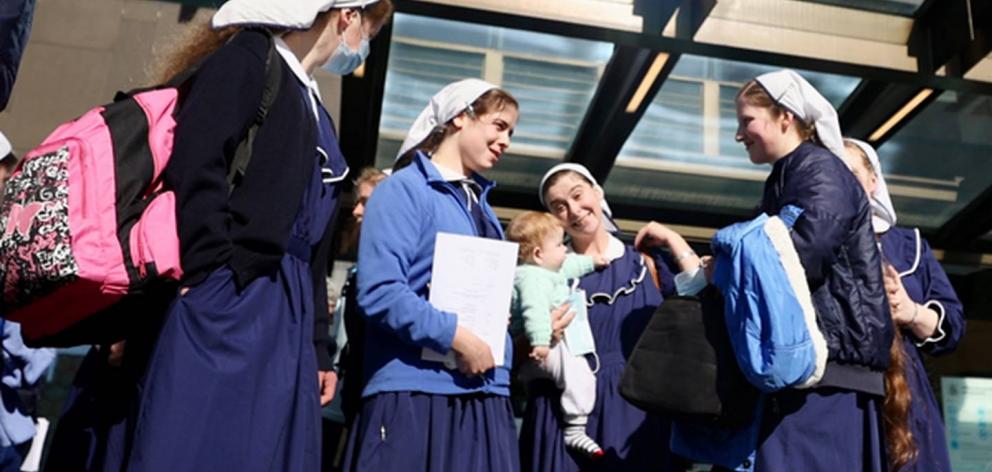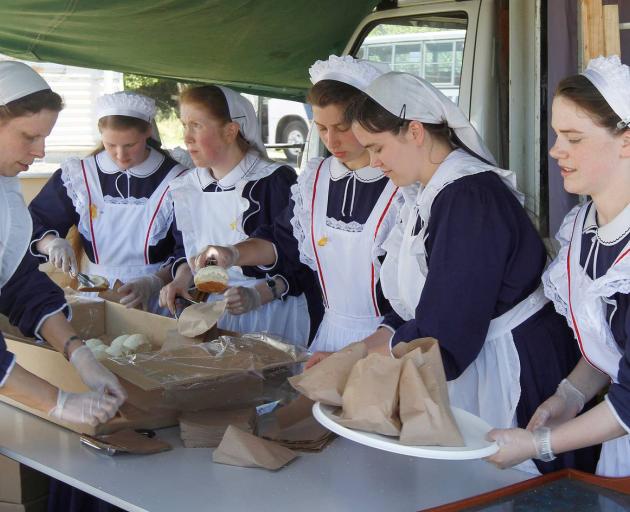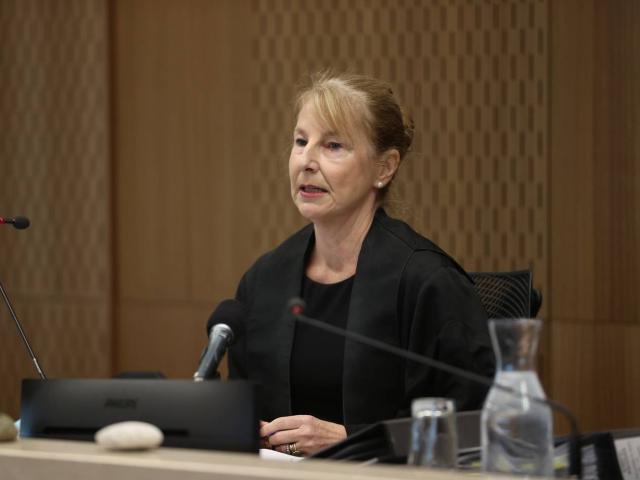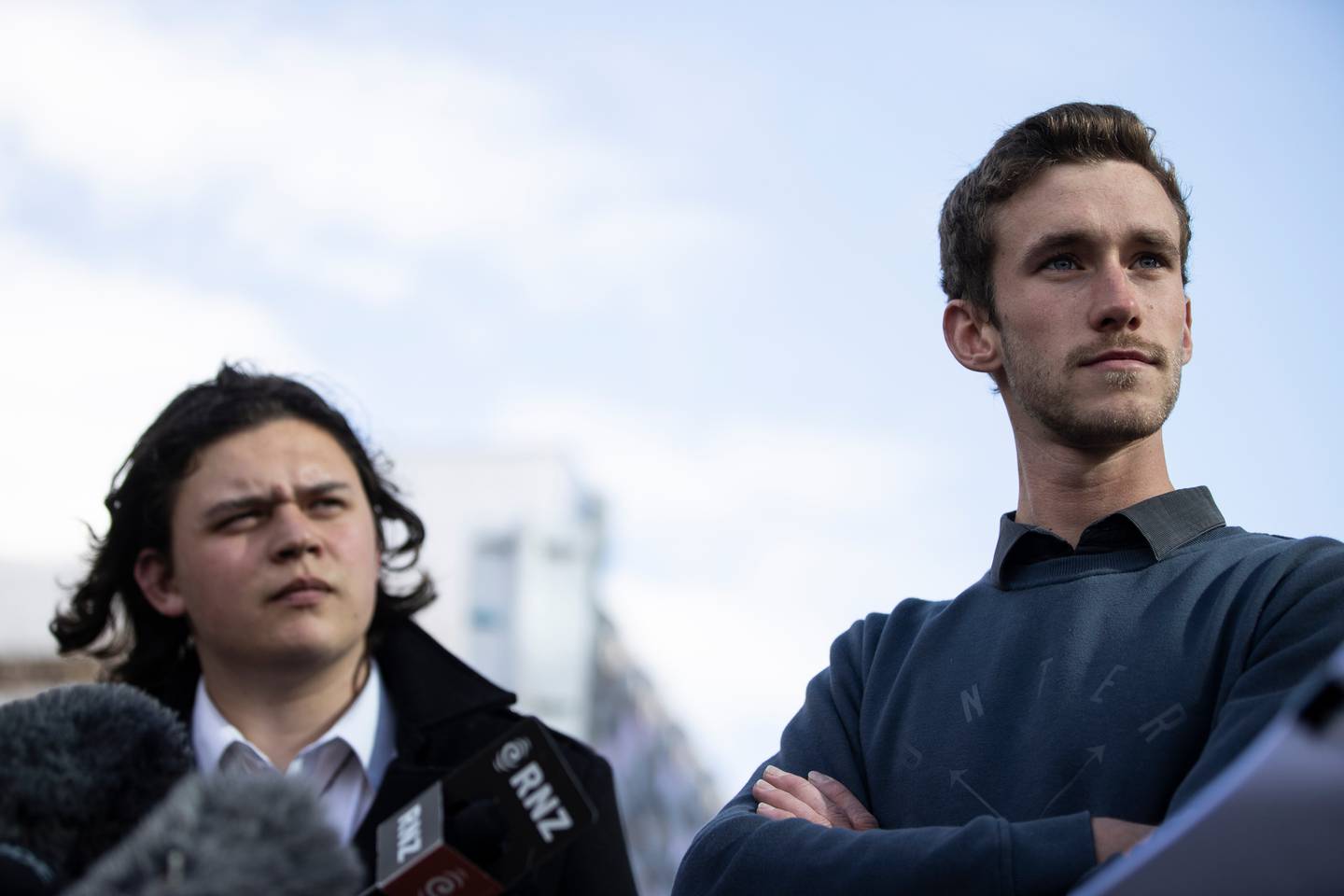
Serenity Pilgrim, Anna Courage, Rose Standtrue, Crystal Loyal, Pearl Valour and Virginia Courage say they were effectively born into and kept in "servitude" - which is illegal in New Zealand - and had no power to choose their own path while living at the West Coast sect.
The court heard today the women will give evidence that they had to work "extremely long" hours serving the 600-strong population, mainly in "deliberately gendered" jobs including "cooking, cleaning and washing clothes".
Some worked in the Gloriavale office and others as midwives.
The women claim they "did not have a choice" as to whether they worked or not" and the roles forced upon them were "expressly and deliberately gendered".
Furthermore, they were expected to "scrub, cook and clean for the rest of their life" or be "pregnant for the rest of their life".
"They were under the control of the shepherds and had no freedom," their lawyer Brian Henry told the court.
"They work, not chores - work ... and the hours get longer and harder.
"They scrub and they clean and they cook and that is their lives ... with the only (break) one week holiday or having babies.
"You don't oppose the shepherds ... you're out of unity if you don't just trot on and behave how you want them to.
"There is no informed choice to stay and the choice to leave is difficult given the obstacles put in front of them."

Their case follows a similar action by a group of former Gloriavale men - Hosea Courage, Daniel Pilgrim and Levi Courage - who the court ruled were employees from when they were just 6 years old, regularly undertaking "strenuous, difficult, and sometimes dangerous" work when they were still legally required to be at school.
In that case, Judge Christina Inglis ruled that the men had worked up to 70 hours a week and were subjected to "rigorous, sometimes violent supervision", being hit if they did not work fast enough and denied food at times.
Both the current and earlier cases followed multiple inquiries into the employment status of people living and working at Gloriavale.
The Labour Inspectorate investigated in 2017 after concerns raised by Charities Services, and again in 2020, after allegations of long working hours were made by two community members.
The results of both inquiries showed that no employment relationships existed within Gloriavale as defined by New Zealand employment law - that members of Gloriavale cannot currently be considered employees.
However, the Employment Court ruled the opposite, that members are employees - and the landmark decision has opened the door for the leavers to take further court action against Gloriavale.
Today Judge Inglis has started hearing opening statements from lawyers for both the women and the community.

The hearing is expected to run for more than a month.
The ex-leaver's lawyer Brian Henry said this morning the case would be "dark" and said the conditions the women were subjected to were "scandalous".
"Put simply, they were not volunteers," he said.
Henry told the court the Gloriavale leaders had "absolute power" over the members and any suggestion that they had any choice or freedom including what they wear, how they have their hair, who they marry and their education was "science fiction".
"You do not question the shepherds ... you follow what they say, you keep unity, everybody behaves and everybody is happy," he said.
"Those who want to think keep quiet - or they just don't think.
"The overseeing shepherd has the ultimate power over this community.
"From a young age they learn to not buck the shepherds ... they don't have the cognitive ability to understand what is in the outside world ... they knew of no other way of life.
"That's all they do, they sleep and they work."
Henry said the community taught that women were "inferior" and were not allowed to do anything to "usurp" any man.
"And that is repugnant," he told the court.
Henry said the work of the women at Gloriavale was "actually abusive".
"People are saying they were volunteers - but what choice did they have?
"There's no freedom of choice… (women) are destined to cook, clean and sew."
The court also heard from Phillip Skelton QC - the lawyer for Gloriavale's leaders.
He said those fighting against the community in court were "very embittered" and "have been waging a campaign against Gloriavale in the courts and in the news media".
He said they would have a "long list of grievances" but much of what they had to say in court would be "hearsay".
"That is the picture of Gloriavale that has been painted by the leavers, who wish to tar Gloriavale with a very dark brush," said Skelton.
About two dozen women who still live at the community would "explain what it is really like" living there.
They refuted the "plainly untrue" evidence their former sisters would give.
Some of the women who will give evidence were in court, alongside others.
A number of the women had young babies and children with them in the courtroom.
"Gloriavale is their home, it is a wonderful place to live and bring up large families," said Skelton.
"They will not try to persuade the courts that there have never been any problems at Gloriavale… no society or community is perfect.
Skelton said at the community "everyone is provided for according to their needs" and "everyone contributed according to their ability".
"There is no dispute that the women in Gloriavale work - and work hard… but work can take place in many different contexts that is not employment," he said.
"Most people do unpaid work at home to support their families and extended families."
Skelton likened the work of the women to that of nuns, sports club and marae volunteers and also those who put their hands up to work for charities and on committees.
"They often work hard but under no legal obligation to do so… without expectation of financial reward," he posed.
He said the "reality" was no one at Gloriavale was an employee nor did they answer to anyone else.
Moreover, the women living there now did not want to be defined as anything more than volunteers for their home and families.
Ultimately, Skelton said the case against the community was nothing more than an attempt to "blacken" it.
And, the language used by ex-members was "highly offensive" and inaccurate.
"Unbalanced language misrepresents life at Gloriavale… a community that wants to live in peace and practise its Christian faith."
Skelton said the women of Gloriavale were educated and "not ignorant" and refuted that they were not worldly.
He said they were offended when people said otherwise.
The women "know of the outside world" and used the internet but "have chosen the Gloriavale life instead".
"They could leave the community if they wanted to," said Skelton.
"The women of Gloriavale know their own minds and make their own decisions, they are not held in servitude... they are not stupid, they are not brainwashed... they are not unwitting, they are not sex slaves.
"These women are not ignorant of the outside world... they read the newspapers, they see and read the negative stories about Gloriavale... they are upset.
"It is not correct they have no comprehension or ability to understand the joys of the outside world... they have made a different choice... they have their own voice."
He said the women of Gloriavale had no grudge against the leavers, they simply wanted to be respected for their own choice to stay.
The hearing continues.

After Judge Inglis released her ruling in the case of the male ex-leavers the leaders of Gloriavale released a public apology.
They claimed "much has changed at Gloriavale since 2018" when founder and convicted child sex offender Hopeful Christian died.
"During this period we have revised our governance and charted new directions for our community.
"We are deeply saddened by the harm members of our community have experienced.
"We apologise for our role in failing to prevent and protect victims of labour exploitation and sexual abuse."
Regarding the working conditions within Gloriavale, the leadership said they "can state categorically that child labour is no longer used in the commercial activities" of any of their businesses.

The leadership also addressed the "safety of children" at the commune.
"Despite all our efforts to create a safe haven, we too have been hurt as we discovered the extent of sexual offending that has occurred within our community," they said.
"We have put in place extensive measures to ensure such events cannot reoccur.
"To conclude, we reiterate that we denounce any and all offending that has occurred at Gloriavale.
"These actions are abhorrent to us, and our hearts go out to those who have suffered."
By Anna Leask












